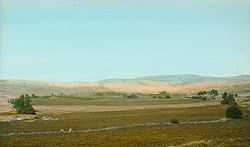Gang Ranch
| Gang Ranch | |
|---|---|
 Gang Ranch Location of Gang Ranch in British Columbia | |
| Coordinates: 51°33′00″N 122°20′00″W / 51.55000°N 122.33333°WCoordinates: 51°33′00″N 122°20′00″W / 51.55000°N 122.33333°W | |
| Country | Canada |
| Province | British Columbia |

The Gang Ranch is a Canadian ranch in the Chilcotin region of the Central Interior of British Columbia. It is located 28 miles (45 km) north of Clinton on the west bank of the Fraser River opposite the Indian Reserve community of Dog Creek. The ranch, near Alkali Lake, was founded in 1863. For many years the largest ranch in North America, it is now the second-largest in Canada, after the Douglas Lake Ranch. The Churn Creek Protected Area is also nearby.
Two American brothers, Thaddeus and Jerome Harper, traveled from Harpers Ferry, Virginia, via California, to British Columbia in the Cariboo Gold Rush. They mined in Yale, and lived in Victoria for a time. At one point, they were accused of supporting the rebel Confederacy and plotting against the nearby North. One account suggests that they were asked to leave the border area of British Columbia. Some miners worked their way up the Fraser River seeking gold and found the remote plateau. Unsuccessful in their search for gold, the Harpers settled on the west bank of the Fraser River in 1863 and installed a gang plow. Thus the Gang Ranch began its long operation.
The Harpers made an agreement with the Chilcotin Indian Kalalest whereby the land at the confluence of the Chilcotin and Fraser rivers was divided between the First Nations and the Harpers. The Harpers began to drive cattle from Washington or Oregon, hundreds of miles on the hoof, northwards to feed the hungry gold miners. One drive was made from Utah. The brothers bought and sold stock and land, moving frequently at first. The town of Horsefly was first called "Harper's Camp" and included a steam sawmill. From their gains with the cattle drives, the brothers expanded the Gang Ranch.
The Harpers had misfortune, including a severe winter in 1878 which killed thousands of cattle. Despite this, the brothers persevered. In 1883, they bought 8,900 acres (36 km2) of Chilcotin land from the government. The brothers also had rangeland at Hat Creek, Cache Creek and Kamloops, in all about 38,000 acres (150 km2). The ranch first operated under the name "Canadian Ranching Company". The brothers ran into financial difficulty and the Western Canadian Ranching Company was sold to an English partner, Galpin, of the Cassell publishing house, in 1891.
Considerable work was needed: fencing pastures and building sawmills, bridges, bunkhouses,and roads. At the same time, they had to oversee the feeding, droving, and rounding-up of thousands of head of cattle in rough terrain. With the goodwill and assistance of the Chilcotin people, the ranch grew and prospered. Families such as Gaspard, Paternaude, Farwell and Kalalest settled in the area.
The English owners continued with the ranch for decades, into the twentieth century. A combination of absentee landowners, salaried English managers, isolation, and rough BC bush meant that the business was not always profitable. The hardscrabble way of the ranch, combined with the hard work of developing a business in raw territory, was costly. Then the Depression and the market crash took its toll. The English owners eventually sold the ranch, but not before introducing English farming practices to the area, and English housewares and furniture to the "Big House" on the premises.
In the late 1970s, the ranch was bought by Alsager Holdings. This was the first time in many years that the ranch had been Canadian owned and television news crews came out several times from Vancouver, to cover the story of the ranch's Canadian ownership and subsequent fall into receivership. Dale Alsager and his wife lived on the ranch in a house they built at the headquarters. Lonnie Jones was then manager and cow boss. He rode and made camp with the cowboy crew. Bob Munsey from Paulina, Oregon was the cow boss before Lonnie Jones took over.